- Home
- Joseph Conrad
A Set of Six Page 2
A Set of Six Read online
Page 2
GASPAR RUIZ
I
A revolutionary war raises many strange characters out of the obscuritywhich is the common lot of humble lives in an undisturbed state ofsociety.
Certain individualities grow into fame through their vices and theirvirtues, or simply by their actions, which may have a temporaryimportance; and then they become forgotten. The names of a few leadersalone survive the end of armed strife and are further preserved inhistory; so that, vanishing from men's active memories, they still existin books.
The name of General Santierra attained that cold paper-and-inkimmortality. He was a South American of good family, and the bookspublished in his lifetime numbered him amongst the liberators of thatcontinent from the oppressive rule of Spain.
That long contest, waged for independence on one side and for dominionon the other, developed in the course of years and the vicissitudes ofchanging fortune the fierceness and inhumanity of a struggle forlife. All feelings of pity and compassion disappeared in the growth ofpolitical hatred. And, as is usual in war, the mass of the people,who had the least to gain by the issue, suffered most in their obscurepersons and their humble fortunes.
General Santierra began his service as lieutenant in the patriot armyraised and commanded by the famous San Martin, afterwards conqueror ofLima and liberator of Peru. A great battle had just been fought on thebanks of the river Bio-Bio. Amongst the prisoners made upon the routedRoyalist troops there was a soldier called Gaspar Ruiz. His powerfulbuild and his big head rendered him remarkable amongst hisfellow-captives. The personality of the man was unmistakable. Somemonths before he had been missed from the ranks of Republican troopsafter one of the many skirmishes which preceded the great battle. Andnow, having been captured arms in hand amongst Royalists, he couldexpect no other fate but to be shot as a deserter.
Gaspar Ruiz, however, was not a deserter; his mind was hardly activeenough to take a discriminating view of the advantages or perilsof treachery. Why should he change sides? He had really been made aprisoner, had suffered ill-usage and many privations. Neither sideshowed tenderness to its adversaries. There came a day when he wasordered, together with some other captured rebels, to march in the frontrank of the Royal troops. A musket had been thrust into his hands.He had taken it. He had marched. He did not want to be killed withcircumstances of peculiar atrocity for refusing to march. He did notunderstand heroism but it was his intention to throw his musket away atthe first opportunity. Meantime he had gone on loading and firing, fromfear of having his brains blown out at the first sign of unwillingness,by some non-commissioned officer of the King of Spain. He tried to setforth these elementary considerations before the sergeant of theguard set over him and some twenty other such deserters, who had beencondemned summarily to be shot.
It was in the quadrangle of the fort at the back of the batteries whichcommand the roadstead of Valparaiso. The officer who had identified himhad gone on without listening to his protestations. His doom was sealed;his hands were tied very tightly together behind his back; his body wassore all over from the many blows with sticks and butts of muskets whichhad hurried him along on the painful road from the place of his captureto the gate of the fort. This was the only kind of systematic attentionthe prisoners had received from their escort during a four days' journeyacross a scantily watered tract of country. At the crossings of rarestreams they were permitted to quench their thirst by lapping hurriedlylike dogs. In the evening a few scraps of meat were thrown amongstthem as they dropped down dead-beat upon the stony ground of thehalting-place.
As he stood in the courtyard of the castle in the early morning, afterhaving been driven hard all night, Gaspar Ruiz's throat was parched, andhis tongue felt very large and dry in his mouth.
And Gaspar Ruiz, besides being very thirsty, was stirred by a feelingof sluggish anger, which he could not very well express, as though thevigour of his spirit were by no means equal to the strength of his body.
The other prisoners in the batch of the condemned hung their heads,looking obstinately on the ground. But Gaspar Ruiz kept on repeating:"What should I desert for to the Royalists? Why should I desert? Tellme, Estaban!"
He addressed himself to the sergeant, who happened to belong to the samepart of the country as himself. But the sergeant, after shrugging hismeagre shoulders once, paid no further attention to the deep murmuringvoice at his back. It was indeed strange that Gaspar Ruiz should desert.His people were in too humble a station to feel much the disadvantagesof any form of government. There was no reason why Gaspar Ruiz shouldwish to uphold in his own person the rule of the King of Spain. Neitherhad he been anxious to exert himself for its subversion. He had joinedthe side of Independence in an extremely reasonable and natural manner.A band of patriots appeared one morning early, surrounding his father'sranche, spearing the watch-dogs and ham-stringing a fat cow all in thetwinkling of an eye, to the cries of "Viva la Libertad!" Their officerdiscoursed of Liberty with enthusiasm and eloquence after a long andrefreshing sleep. When they left in the evening, taking with them someof Ruiz, the father's, best horses to replace their own lamed animals,Gaspar Ruiz went away with them, having been invited pressingly to do soby the eloquent officer.
Shortly afterwards a detachment of Royalist troops coming to pacify thedistrict, burnt the ranche, carried off the remaining horses andcattle, and having thus deprived the old people of all their worldlypossessions, left them sitting under a bush in the enjoyment of theinestimable boon of life.
II
Gaspar Ruiz, condemned to death as a deserter, was not thinking eitherof his native place or of his parents, to whom he had been a good son onaccount of the mildness of his character and the great strength of hislimbs. The practical advantage of this last was made still morevaluable to his father by his obedient disposition. Gaspar Ruiz had anacquiescent soul.
But it was stirred now to a sort of dim revolt by his dislike to die thedeath of a traitor. He was not a traitor. He said again to the sergeant:"You know I did not desert, Estaban. You know I remained behind amongstthe trees with three others to keep the enemy back while the detachmentwas running away!"
Lieutenant Santierra, little more than a boy at the time, and unused asyet to the sanguinary imbecilities of a state of war, had lingerednear by, as if fascinated by the sight of these men who were to be shotpresently--"for an example"--as the Commandante had said.
The sergeant, without deigning to look at the prisoner, addressedhimself to the young officer with a superior smile.
"Ten men would not have been enough to make him a prisoner, mi teniente.Moreover, the other three rejoined the detachment after dark. Why shouldhe, unwounded and the strongest of them all, have failed to do so?"
"My strength is as nothing against a mounted man with a lasso," GasparRuiz protested, eagerly. "He dragged me behind his horse for half amile."
At this excellent reason the sergeant only laughed contemptuously. Theyoung officer hurried away after the Commandante.
Presently the adjutant of the castle came by. He was a truculent,raw-boned man in a ragged uniform. His spluttering voice issued out ofa flat yellow face. The sergeant learned from him that the condemned menwould not be shot till sunset. He begged then to know what he was to dowith them meantime.
The adjutant looked savagely round the courtyard and, pointing to thedoor of a small dungeon-like guardroom, receiving light and air throughone heavily barred window, said: "Drive the scoundrels in there."
The sergeant, tightening his grip upon the stick he carried in virtueof his rank, executed this order with alacrity and zeal. He hit GasparRuiz, whose movements were slow, over his head and shoulders. GasparRuiz stood still for a moment under the shower of blows, biting hislip thoughtfully as if absorbed by a perplexing mental process--thenfollowed the others without haste. The door was locked, and the adjutantcarried off the key.
By noon the heat of that vaulted place crammed to suffocation had becomeunbearable. The prisoners crowded towards the window, begging theirgu
ards for a drop of water; but the soldiers remained lying in indolentattitudes wherever there was a little shade under a wall, while thesentry sat with his back against the door smoking a cigarette, andraising his eyebrows philosophically from time to time. Gaspar Ruizhad pushed his way to the window with irresistible force. His capaciouschest needed more air than the others; his big face, resting with itschin on the ledge, pressed close to the bars, seemed to support theother faces crowding up for breath. From moaned entreaties they hadpassed to desperate cries, and the tumultuous howling of those thirstymen obliged a young officer who was just then crossing the courtyard toshout in order to make himself heard.
"Why don't you give some water to these prisoners?"
The sergeant, with an air of surprised innocence, excused himself by theremark that all those men were condemned to die in a very few hours.
Lieutenant Santierra stamped his foot. "They are condemned to death, notto torture," he shouted. "Give them some water at once."
Impressed by this appearance of anger, the soldiers bestirredthemselves, and the sentry, snatching up his musket, stood to attention.
But when a couple of buckets were found and filled from the well, it wasdiscovered that they could not be passed through the bars, which wereset too close. At the prospect of quenching their thirst, the shrieks ofthose trampled down in the struggle to get near the opening became veryheartrending. But when the soldiers who had lifted the buckets towardsthe window put them to the ground again helplessly, the yell ofdisappointment was still more terrible.
The soldiers of the army of Independence were not equipped withcanteens. A small tin cup was found, but its approach to the openingcaused such a commotion, such yells of rage and pain in the vague massof limbs behind the straining faces at the window, that LieutenantSantierra cried out hurriedly, "No, no--you must open the door,sergeant."
The sergeant, shrugging his shoulders, explained that he had no rightto open the door even if he had had the key. But he had not the key.The adjutant of the garrison kept the key. Those men were giving muchunnecessary trouble, since they had to die at sunset in any case.Why they had not been shot at once early in the morning he could notunderstand.
Lieutenant Santierra kept his back studiously to the window. It wasat his earnest solicitations that the Commandante had delayed theexecution. This favour had been granted to him in consideration ofhis distinguished family and of his father's high position amongst thechiefs of the Republican party. Lieutenant Santierra believed that theGeneral commanding would visit the fort some time in the afternoon,and he ingenuously hoped that his naive intercession would inducethat severe man to pardon some, at least, of those criminals. In therevulsion of his feeling his interference stood revealed now as guiltyand futile meddling. It appeared to him obvious that the general wouldnever even consent to listen to his petition. He could never save thosemen, and he had only made himself responsible for the sufferings addedto the cruelty of their fate.
"Then go at once and get the key from the adjutant," said LieutenantSantierra.
The sergeant shook his head with a sort of bashful smile, while his eyesglanced sideways at Gaspar Ruiz's face, motionless and silent, staringthrough the bars at the bottom of a heap of other haggard, distorted,yelling faces.
His worship the adjutant de Plaza, the sergeant murmured, was having hissiesta; and supposing that he, the sergeant, would be allowed access tohim, the only result he expected would be to have his soul flogged outof his body for presuming to disturb his worship's repose. He made adeprecatory movement with his hands, and stood stock-still, looking downmodestly upon his brown toes.
Lieutenant Santierra glared with indignation, but hesitated. Hishandsome oval face, as smooth as a girl's, flushed with the shame ofhis perplexity. Its nature humiliated his spirit. His hairless upper liptrembled; he seemed on the point of either bursting into a fit of rageor into tears of dismay.
Fifty years later, General Santierra, the venerable relic ofrevolutionary times, was well able to remember the feelings of theyoung lieutenant. Since he had given up riding altogether, and foundit difficult to walk beyond the limits of his garden, the general'sgreatest delight was to entertain in his house the officers of theforeign men-of-war visiting the harbour. For Englishmen he had apreference, as for old companions in arms. English naval men of allranks accepted his hospitality with curiosity, because he had known LordCochrane and had taken part, on board the patriot squadron commandedby that marvellous seaman, in the cutting out and blockading operationsbefore Callao--an episode of unalloyed glory in the wars of Independenceand of endless honour in the fighting tradition of Englishmen. He was afair linguist, this ancient survivor of the Liberating armies. A trickof smoothing his long white beard whenever he was short of a word inFrench or English imparted an air of leisurely dignity to the tone ofhis reminiscences.
III
"Yes, my friends," he used to say to his guests, "what would you have?A youth of seventeen summers, without worldly experience, and owingmy rank only to the glorious patriotism of my father, may God rest hissoul. I suffered immense humiliation, not so much from the disobedienceof that subordinate, who, after all, was responsible for thoseprisoners; but I suffered because, like the boy I was, I myself dreadedgoing to the adjutant for the key. I had felt, before, his rough andcutting tongue. Being quite a common fellow, with no merit except hissavage valour, he made me feel his contempt and dislike from thefirst day I joined my battalion in garrison at the fort. It was onlya fortnight before! I would have confronted him sword in hand, but Ishrank from the mocking brutality of his sneers.
"I don't remember having been so miserable in my life before or since.The torment of my sensibility was so great that I wished the sergeant tofall dead at my feet, and the stupid soldiers who stared at me toturn into corpses; and even those wretches for whom my entreaties hadprocured a reprieve I wished dead also, because I could not face themwithout shame. A mephitic heat like a whiff of air from hell came out ofthat dark place in which they were confined. Those at the window who hadheard what was going on jeered at me in very desperation: one of thesefellows, gone mad no doubt, kept on urging me volubly to order thesoldiers to fire through the window. His insane loquacity made my heartturn faint. And my feet were like lead. There was no higher officer towhom I could appeal. I had not even the firmness of spirit to simply goaway.
"Benumbed by my remorse, I stood with my back to the window. You mustnot suppose that all this lasted a long time. How long could it havebeen? A minute? If you measured by mental suffering it was like ahundred years; a longer time than all my life has been since. No,certainly, it was not so much as a minute. The hoarse screaming of thosemiserable wretches died out in their dry throats, and then suddenly avoice spoke, a deep voice muttering calmly. It called upon me to turnround.
"That voice, senores, proceeded from the head of Gaspar Ruiz. Of hisbody I could see nothing. Some of his fellow-captives had clambered uponhis back. He was holding them up. His eyes blinked without looking atme. That and the moving of his lips was all he seemed able to manage inhis overloaded state. And when I turned round, this head, that seemedmore than human size resting on its chin under a multitude of otherheads, asked me whether I really desired to quench the thirst of thecaptives.
"I said, 'Yes, yes!' eagerly, and came up quite close to the window. Iwas like a child, and did not know what would happen. I was anxious tobe comforted in my helplessness and remorse.
"'Have you the authority, Senor teniente, to release my wrists fromtheir bonds?' Gaspar Ruiz's head asked me.
"His features expressed no anxiety, no hope; his heavy eyelids blinkedupon his eyes that looked past me straight into the courtyard.
"As if in an ugly dream, I spoke, stammering: 'What do you mean? And howcan I reach the bonds on your wrists?'
"'I will try what I can do,' he said; and then that large staringhead moved at last, and all the wild faces piled up in that windowdisappeared, tumbling down. He had shaken his load off with onemovemen
t, so strong he was.
"And he had not only shaken it off, but he got free of the crush andvanished from my sight. For a moment there was no one at all to be seenat the window. He had swung about, butting and shouldering, clearinga space for himself in the only way he could do it with his hands tiedbehind his back.
"Finally, backing to the opening, he pushed out to me between the barshis wrists, lashed with many turns of rope. His hands, very swollen,with knotted veins, looked enormous and unwieldy. I saw his bent back.It was very broad. His voice was like the muttering of a bull.
"'Cut, Senor teniente. Cut!'
"I drew my sword, my new unblunted sword that had seen no service asyet, and severed the many turns of the hide rope. I did this withoutknowing the why and the wherefore of my action, but as it were compelledby my faith in that man. The sergeant made as if to cry out, butastonishment deprived him of his voice, and he remained standing withhis mouth open as if overtaken by sudden imbecility.
"I sheathed my sword and faced the soldiers. An air of awestruckexpectation had replaced their usual listless apathy. I heard the voiceof Gaspar Ruiz shouting inside, but the words I could not make outplainly. I suppose that to see him with his arms free augmented theinfluence of his strength: I mean by this, the spiritual influence thatwith ignorant people attaches to an exceptional degree of bodily vigour.In fact, he was no more to be feared than before, on account of thenumbness of his arms and hands, which lasted for some time.
"The sergeant had recovered his power of speech. 'By all the saints!'he cried, 'we shall have to get a cavalry man with a lasso to secure himagain, if he is to be led to the place of execution. Nothing less than agood enlazador on a good horse can subdue him. Your worship was pleasedto perform a very mad thing.'
"I had nothing to say. I was surprised myself, and I felt a childishcuriosity to see what would happen next. But the sergeant was thinkingof the difficulty of controlling Gaspar Ruiz when the time for making anexample would come.
"'Or perhaps,' the sergeant pursued, vexedly, 'we shall be obliged toshoot him down as he dashes out when the door is opened.' He was goingto give further vent to his anxieties as to the proper carrying outof the sentence; but he interrupted himself with a sudden exclamation,snatched a musket from a soldier, and stood watchful with his eyes fixedon the window."
IV
"Gaspar Ruiz had clambered up on the sill, and sat down there with hisfeet against the thickness of the wall and his knees slightly bent.The window was not quite broad enough for the length of his legs. Itappeared to my crestfallen perception that he meant to keep the windowall to himself. He seemed to be taking up a comfortable position. Nobodyinside dared to approach him now he could strike with his hands.
"'Por Dios!' I heard the sergeant muttering at my elbow, 'I shall shoothim through the head now, and get rid of that trouble. He is a condemnedman.'
"At that I looked at him angrily. 'The general has not confirmed thesentence,' I said--though I knew well in my heart that these were butvain words. The sentence required no confirmation. 'You have no right toshoot him unless he tries to escape,' I added, firmly.
"'But sangre de Dios!' the sergeant yelled out, bringing his musket upto the shoulder, 'he is escaping now. Look!'
"But I, as if that Gaspar Ruiz had cast a spell upon me, struck themusket upward, and the bullet flew over the roofs somewhere. Thesergeant dashed his arm to the ground and stared. He might havecommanded the soldiers to fire, but he did not. And if he had he wouldnot have been obeyed, I think, just then.
"With his feet against the thickness of the wall and his hairy handsgrasping the iron bar, Gaspar sat still. It was an attitude. Nothinghappened for a time. And suddenly it dawned upon us that he wasstraightening his bowed back and contracting his arms. His lips weretwisted into a snarl. Next thing we perceived was that the bar of forgediron was being bent slowly by the mightiness of his pull. The sunwas beating full upon his cramped, unquivering figure. A shower ofsweat-drops burst out of his forehead. Watching the bar grow crooked, Isaw a little blood ooze from under his finger-nails. Then he let go.For a moment he remained all huddled up, with a hanging head, lookingdrowsily into the upturned palms of his mighty hands. Indeed he seemedto have dozed off. Suddenly he flung himself backwards on the sill, andsetting the soles of his bare feet against the other middle bar, he bentthat one, too, but in the opposite direction from the first.
"Such was his strength, which in this case relieved my painful feelings.And the man seemed to have done nothing. Except for the change ofposition in order to use his feet, which made us all start by itsswiftness, my recollection is that of immobility. But he had bent thebars wide apart. And now he could get out if he liked; but he droppedhis legs inwards, and looking over his shoulder beckoned to thesoldiers. 'Hand up the water,' he said. 'I will give them all a drink.'
"He was obeyed. For a moment I expected man and bucket to disappear,overwhelmed by the rush of eagerness; I thought they would pull him downwith their teeth. There was a rush, but holding the bucket on his lap herepulsed the assault of those wretches by the mere swinging of his feet.They flew backwards at every kick, yelling with pain; and the soldierslaughed, gazing at the window.
"They all laughed, holding their sides, except the sergeant, who wasgloomy and morose. He was afraid the prisoners would rise and breakout--which would have been a bad example. But there was no fear ofthat, and I stood myself before the window with my drawn sword. Whensufficiently tamed by the strength of Gaspar Ruiz they came up one byone, stretching their necks and presenting their lips to the edge of thebucket which the strong man tilted towards them from his knees withan extraordinary air of charity, gentleness, and compassion. Thatbenevolent appearance was of course the effect of his care in notspilling the water and of his attitude as he sat on the sill; for, if aman lingered with his lips glued to the rim of the bucket after GasparRuiz had said 'You have had enough,' there would be no tenderness ormercy in the shove of the foot which would send him groaning and doubledup far into the interior of the prison, where he would knock down twoor three others before he fell himself. They came up to him again andagain; it looked as if they meant to drink the well dry before going totheir death; but the soldiers were so amused by Gaspar Ruiz's systematicproceedings that they carried the water up to the window cheerfully.
"When the adjutant came out after his siesta there was some trouble overthis affair, I can assure you. And the worst of it was that the generalwhom we expected never came to the castle that day."
The guests of General Santierra unanimously expressed their regret thatthe man of such strength and patience had not been saved.
"He was not saved by my interference," said the General. "The prisonerswere led to execution half an hour before sunset. Gaspar Ruiz, contraryto the sergeant's apprehensions, gave no trouble. There was no necessityto get a cavalry man with a lasso in order to subdue him, as if he werea wild bull of the campo. I believe he marched out with his arms freeamongst the others who were bound. I did not see. I was not there. I hadbeen put under arrest for interfering with the prisoner's guard. Aboutdusk, sitting dismally in my quarters, I heard three volleys fired, andthought that I should never hear of Gaspar Ruiz again. He fell with theothers. But we were to hear of him nevertheless, though the sergeantboasted that as he lay on his face expiring or dead in the heap of theslain, he had slashed his neck with a sword. He had done this, he said,to make sure of ridding the world of a dangerous traitor.
"I confess to you, senores, that I thought of that strong man with asort of gratitude, and with some admiration. He had used his strengthhonourably. There dwelt, then, in his soul no fierceness correspondingto the vigour of his body."
V
Gaspar Ruiz, who could with ease bend apart the heavy iron bars of theprison, was led out with others to summary execution. "Every bullet hasits billet," runs the proverb. All the merit of proverbs consists inthe concise and picturesque expression. In the surprise of our minds isfound their persuasiveness. In other words,
we are struck and convincedby the shock.
What surprises us is the form, not the substance. Proverbs areart--cheap art. As a general rule they are not true; unless indeed theyhappen to be mere platitudes, as for instance the proverb, "Half aloaf is better than no bread," or "A miss is as good as a mile." Someproverbs are simply imbecile, others are immoral. That one evolved outof the naive heart of the great Russian people, "Man discharges thepiece, but God carries the bullet," is piously atrocious, and at bittervariance with the accepted conception of a compassionate God. It wouldindeed be an inconsistent occupation for the Guardian of the poor, theinnocent, and the helpless, to carry the bullet, for instance, into theheart of a father.
Gaspar Ruiz was childless, he had no wife, he had never been in love.He had hardly ever spoken to a woman, beyond his mother and the ancientnegress of the household, whose wrinkled skin was the colour of cinders,and whose lean body was bent double from age. If some bullets from thosemuskets fired off at fifteen paces were specifically destined forthe heart of Gaspar Ruiz, they all missed their billet. One, however,carried away a small piece of his ear, and another a fragment of fleshfrom his shoulder.
A red and unclouded sun setting into a purple ocean looked with a fierystare upon the enormous wall of the Cordilleras, worthy witnesses of hisglorious extinction. But it is inconceivable that it should have seenthe ant-like men busy with their absurd and insignificant trials ofkilling and dying for reasons that, apart from being generally childish,were also imperfectly understood. It did light up, however, the backsof the firing party and the faces of the condemned men. Some of themhad fallen on their knees, others remained standing, a few averted theirheads from the levelled barrels of muskets. Gaspar Ruiz, upright, theburliest of them all, hung his big shock head. The low sun dazzled him alittle, and he counted himself a dead man already.
He fell at the first discharge. He fell because he thought he was a deadman. He struck the ground heavily. The jar of the fall surprised him."I am not dead apparently," he thought to himself, when he heard theexecution platoon reloading its arms at the word of command. It was thenthat the hope of escape dawned upon him for the first time. He remainedlying stretched out with rigid limbs under the weight of two bodiescollapsed crosswise upon his back.
By the time the soldiers had fired a third volley into the slightlystirring heaps of the slain, the sun had gone out of sight, and almostimmediately with the darkening of the ocean dusk fell upon the coasts ofthe young Republic. Above the gloom of the lowlands the snowy peaksof the Cordilleras remained luminous and crimson for a long time. Thesoldiers before marching back to the fort sat down to smoke.
The sergeant with a naked sword in his hand strolled away by himselfalong the heap of the dead. He was a humane man, and watched for anystir or twitch of limb in the merciful idea of plunging the point of hisblade into any body giving the slightest sign of life. But none of thebodies afforded him an opportunity for the display of this charitableintention. Not a muscle twitched amongst them, not even the powerfulmuscles of Gaspar Ruiz, who, deluged with the blood of his neighboursand shamming death, strove to appear more lifeless than the others.
He was lying face down. The sergeant recognized him by his stature, andbeing himself a very small man, looked with envy and contempt at theprostration of so much strength. He had always disliked that particularsoldier. Moved by an obscure animosity, he inflicted a long gash acrossthe neck of Gaspar Ruiz, with some vague notion of making sure of thatstrong man's death, as if a powerful physique were more able to resistthe bullets. For the sergeant had no doubt that Gaspar Ruiz had beenshot through in many places. Then he passed on, and shortly afterwardsmarched off with his men, leaving the bodies to the care of crows andvultures.
Gaspar Ruiz had restrained a cry, though it had seemed to him that hishead was cut off at a blow; and when darkness came, shaking off thedead, whose weight had oppressed him, he crawled away over the plain onhis hands and knees. After drinking deeply, like a wounded beast, ata shallow stream, he assumed an upright posture, and staggered onlight-headed and aimless, as if lost amongst the stars of the clearnight. A small house seemed to rise out of the ground before him. Hestumbled into the porch and struck at the door with his fist. Therewas not a gleam of light. Gaspar Ruiz might have thought that theinhabitants had fled from it, as from many others in the neighbourhood,had it not been for the shouts of abuse that answered his thumping. Inhis feverish and enfeebled state the angry screaming seemed to him partof a hallucination belonging to the weird, dreamlike feeling of hisunexpected condemnation to death, of the thirst suffered, of the volleysfired at him within fifteen paces, of his head being cut off at a blow."Open the door!" he cried. "Open in the name of God!"
An infuriated voice from within jeered at him: "Come in, come in. Thishouse belongs to you. All this land belongs to you. Come and take it."
"For the love of God," Gaspar Ruiz murmured.
"Does not all the land belong to you patriots?" the voice on the otherside of the door screamed on. "Are you not a patriot?"
Gaspar Ruiz did not know. "I am a wounded man," he said, apathetically.
All became still inside. Gaspar Ruiz lost the hope of being admitted,and lay down under the porch just outside the door. He was utterlycareless of what was going to happen to him. All his consciousnessseemed to be concentrated in his neck, where he felt a severe pain. Hisindifference as to his fate was genuine. The day was breaking when heawoke from a feverish doze; the door at which he had knocked in the darkstood wide open now, and a girl, steadying herself with her outspreadarms, leaned over the threshold. Lying on his back, he stared up at her.Her face was pale and her eyes were very dark; her hair hung down blackas ebony against her white cheeks; her lips were full and red. Beyondher he saw another head with long grey hair, and a thin old face with apair of anxiously clasped hands under the chin.
VI
"I knew those people by sight," General Santierra would tell his guestsat the dining-table. "I mean the people with whom Gaspar Ruiz foundshelter. The father was an old Spaniard, a man of property ruined by therevolution. His estates, his house in town, his money, everything he hadin the world had been confiscated by proclamation, for he was a bitterfoe of our independence. From a position of great dignity and influenceon the Viceroy's Council he became of less importance than his own negroslaves made free by our glorious revolution. He had not even the meansto flee the country, as other Spaniards had managed to do. It may bethat, wandering ruined and houseless, and burdened with nothing buthis life, which was left to him by the clemency of the ProvisionalGovernment, he had simply walked under that broken roof of old tiles. Itwas a lonely spot. There did not seem to be even a dog belonging to theplace. But though the roof had holes, as if a cannon-ball or two haddropped through it, the wooden shutters were thick and tight-closed allthe time.
"My way took me frequently along the path in front of that miserablerancho. I rode from the fort to the town almost every evening, to sighat the window of a lady I was in love with, then. When one is young, youunderstand. . . . She was a good patriot, you may believe. Caballeros,credit me or not, political feeling ran so high in those days that Ido not believe I could have been fascinated by the charms of a woman ofRoyalist opinions. . . ."
Murmurs of amused incredulity all round the table interrupted theGeneral; and while they lasted he stroked his white beard gravely.
"Senores," he protested, "a Royalist was a monster to our overwroughtfeelings. I am telling you this in order not to be suspected of theslightest tenderness towards that old Royalist's daughter. Moreover,as you know, my affections were engaged elsewhere. But I could not helpnoticing her on rare occasions when with the front door open she stoodin the porch.
"You must know that this old Royalist was as crazy as a man can be. Hispolitical misfortunes, his total downfall and ruin, had disordered hismind. To show his contempt for what we patriots could do, he affected tolaugh at his imprisonment, at the confiscation of his lands, the burningof his houses, and a
t the misery to which he and his womenfolk werereduced. This habit of laughing had grown upon him, so that he wouldbegin to laugh and shout directly he caught sight of any stranger. Thatwas the form of his madness.
"I, of course, disregarded the noise of that madman with that feeling ofsuperiority the success of our cause inspired in us Americans. I supposeI really despised him because he was an old Castilian, a Spaniard born,and a Royalist. Those were certainly no reasons to scorn a man; but forcenturies Spaniards born had shown their contempt of us Americans, menas well descended as themselves, simply because we were what theycalled colonists. We had been kept in abasement and made to feel ourinferiority in social intercourse. And now it was our turn. It was safefor us patriots to display the same sentiments; and I being a youngpatriot, son of a patriot, despised that old Spaniard, and despisinghim I naturally disregarded his abuse, though it was annoying to myfeelings. Others perhaps would not have been so forbearing.
"He would begin with a great yell--'I see a patriot. Another of them!'long before I came abreast of the house. The tone of his senselessrevilings, mingled with bursts of laughter, was sometimes piercinglyshrill and sometimes grave. It was all very mad; but I felt it incumbentupon my dignity to check my horse to a walk without even glancingtowards the house, as if that man's abusive clamour in the porchwere less than the barking of a cur. Always I rode by preserving anexpression of haughty indifference on my face.
"It was no doubt very dignified; but I should have done better if Ihad kept my eyes open. A military man in war time should never considerhimself off duty; and especially so if the war is a revolutionary war,when the enemy is not at the door, but within your very house. At suchtimes the heat of passionate convictions passing into hatred, removesthe restraints of honour and humanity from many men and of delicacy andfear from some women. These last, when once they throw off the timidityand reserve of their sex, become by the vivacity of their intelligenceand the violence of their merciless resentment more dangerous than somany armed giants."
The General's voice rose, but his big hand stroked his white beard twicewith an effect of venerable calmness. "Si, Senores! Women are ready torise to the heights of devotion unattainable by us men, or to sink intothe depths of abasement which amazes our masculine prejudices. I amspeaking now of exceptional women, you understand. . . ."
Here one of the guests observed that he had never met a woman yet whowas not capable of turning out quite exceptional under circumstancesthat would engage her feelings strongly. "That sort of superiority inrecklessness they have over us," he concluded, "makes of them the moreinteresting half of mankind."
The General, who bore the interruption with gravity, nodded courteousassent. "Si. Si. Under circumstances. . . . Precisely. They can do aninfinite deal of mischief sometimes in quite unexpected ways. For whocould have imagined that a young girl, daughter of a ruined Royalistwhose life was held only by the contempt of his enemies, would have hadthe power to bring death and devastation upon two flourishing provincesand cause serious anxiety to the leaders of the revolution in the veryhour of its success!" He paused to let the wonder of it penetrate ourminds.
"Death and devastation," somebody murmured in surprise: "how shocking!"
The old General gave a glance in the direction of the murmur and wenton. "Yes. That is, war--calamity. But the means by which she obtainedthe power to work this havoc on our southern frontier seem to me, whohave seen her and spoken to her, still more shocking. That particularthing left on my mind a dreadful amazement which the further experienceof life, of more than fifty years, has done nothing to diminish." Helooked round as if to make sure of our attention, and, in a changedvoice: "I am, as you know, a republican, son of a Liberator," hedeclared. "My incomparable mother, God rest her soul, was a Frenchwoman,the daughter of an ardent republican. As a boy I fought for liberty;I've always believed in the equality of men; and as to theirbrotherhood, that, to my mind, is even more certain. Look at the fierceanimosity they display in their differences. And what in the world doyou know that is more bitterly fierce than brothers' quarrels?"
All absence of cynicism checked an inclination to smile at this view ofhuman brotherhood. On the contrary, there was in the tone the melancholynatural to a man profoundly humane at heart who from duty, fromconviction, and from necessity, had played his part in scenes ofruthless violence.
The General had seen much of fratricidal strife. "Certainly. There is nodoubt of their brotherhood," he insisted. "All men are brothers, andas such know almost too much of each other. But"--and here in theold patriarchal head, white as silver, the black eyes humorouslytwinkled--"if we are all brothers, all the women are not our sisters."
One of the younger guests was heard murmuring his satisfaction at thefact. But the General continued, with deliberate earnestness: "They areso different! The tale of a king who took a beggar-maid for a partner ofhis throne may be pretty enough as we men look upon ourselves and uponlove. But that a young girl, famous for her haughty beauty and, onlya short time before, the admired of all at the balls in the Viceroy'spalace, should take by the hand a guasso, a common peasant, isintolerable to our sentiment of women and their love. It is madness.Nevertheless it happened. But it must be said that in her case it wasthe madness of hate--not of love."
After presenting this excuse in a spirit of chivalrous justice, theGeneral remained silent for a time. "I rode past the house every dayalmost," he began again, "and this was what was going on within. But howit was going on no mind of man can conceive. Her desperation musthave been extreme, and Gaspar Ruiz was a docile fellow. He had been anobedient soldier. His strength was like an enormous stone lying on theground, ready to be hurled this way or that by the hand that picks itup.
"It is clear that he would tell his story to the people who gave himthe shelter he needed. And he needed assistance badly. His wound was notdangerous, but his life was forfeited. The old Royalist being wrapped upin his laughing madness, the two women arranged a hiding-place for thewounded man in one of the huts amongst the fruit trees at the back ofthe house. That hovel, an abundance of clear water while the fever wason him, and some words of pity were all they could give. I supposehe had a share of what food there was. And it would be but little: ahandful of roasted corn, perhaps a dish of beans, or a piece of breadwith a few figs. To such misery were those proud and once wealthy peoplereduced."
VII
General Santierra was right in his surmise. Such was the exact nature ofthe assistance which Gaspar Ruiz, peasant son of peasants, receivedfrom the Royalist family whose daughter had opened the door of theirmiserable refuge to his extreme distress. Her sombre resolution ruledthe madness of her father and the trembling bewilderment of her mother.
She had asked the strange man on the doorstep, "Who wounded you?"
"The soldiers, senora," Gaspar Ruiz had answered, in a faint voice.
"Patriots?"
"Si."
"What for?"
"Deserter," he gasped, leaning against the wall under the scrutiny ofher black eyes. "I was left for dead over there."
She led him through the house out to a small hut of clay and reeds, lostin the long grass of the overgrown orchard. He sank on a heap of maizestraw in a corner, and sighed profoundly.
"No one will look for you here," she said, looking down at him. "Nobodycomes near us. We, too, have been left for dead--here."
He stirred uneasily on his heap of dirty straw, and the pain in his neckmade him groan deliriously.
"I shall show Estaban some day that I am alive yet," he mumbled.
He accepted her assistance in silence, and the many days of pain wentby. Her appearances in the hut brought him relief and became connectedwith the feverish dreams of angels which visited his couch; for GasparRuiz was instructed in the mysteries of his religion, and had evenbeen taught to read and write a little by the priest of his village. Hewaited for her with impatience, and saw her pass out of the dark hut anddisappear in the brilliant sunshine with poignant regret. He discovered
that, while he lay there feeling so very weak, he could, by closing hiseyes, evoke her face with considerable distinctness. And this discoveredfaculty charmed the long, solitary hours of his convalescence. Later on,when he began to regain his strength, he would creep at dusk from hishut to the house and sit on the step of the garden door.
In one of the rooms the mad father paced to and fro, muttering tohimself with short, abrupt laughs. In the passage, sitting on astool, the mother sighed and moaned. The daughter, in rough threadbareclothing, and her white haggard face half hidden by a coarse manta,stood leaning against the side of the door. Gaspar Ruiz, with his elbowspropped on his knees and his head resting in his hands, talked to thetwo women in an undertone.
The common misery of destitution would have made a bitter mockery of amarked insistence on social differences. Gaspar Ruiz understood this inhis simplicity. From his captivity amongst the Royalists he could givethem news of people they knew. He described their appearance; and whenhe related the story of the battle in which he was recaptured the twowomen lamented the blow to their cause and the ruin of their secrethopes.
He had no feeling either way. But he felt a great devotion for thatyoung girl. In his desire to appear worthy of her condescension, heboasted a little of his bodily strength. He had nothing else to boastof. Because of that quality his comrades treated him with as great adeference, he explained, as though he had been a sergeant, both in campand in battle.
"I could always get as many as I wanted to follow me anywhere, senorita.I ought to have been made an officer, because I can read and write."
Behind him the silent old lady fetched a moaning sigh from time to time;the distracted father muttered to himself, pacing the sala; and GasparRuiz would raise his eyes now and then to look at the daughter of thesepeople.
He would look at her with curiosity because she was alive, and also withthat feeling of familiarity and awe with which he had contemplatedin churches the inanimate and powerful statues of the saints, whoseprotection is invoked in dangers and difficulties. His difficulty wasvery great.
He could not remain hiding in an orchard for ever and ever. He knew alsovery well that before he had gone half a day's journey in any direction,he would be picked up by one of the cavalry patrols scouring thecountry, and brought into one or another of the camps where the patriotarmy destined for the liberation of Peru was collected. There hewould in the end be recognized as Gaspar Ruiz--the deserter to theRoyalists--and no doubt shot very effectually this time. There did notseem any place in the world for the innocent Gaspar Ruiz anywhere.And at this thought his simple soul surrendered itself to gloom andresentment as black as night.
They had made him a soldier forcibly. He did not mind being a soldier.And he had been a good soldier as he had been a good son, because of hisdocility and his strength. But now there was no use for either. They hadtaken him from his parents, and he could no longer be a soldier--not agood soldier at any rate. Nobody would listen to his explanations. Whatinjustice it was! What injustice!
And in a mournful murmur he would go over the story of his capture andrecapture for the twentieth time. Then, raising his eyes to the silentgirl in the doorway, "Si, senorita," he would say with a deep sigh,"injustice has made this poor breath in my body quite worthless to meand to anybody else. And I do not care who robs me of it."
One evening, as he exhaled thus the plaint of his wounded soul, shecondescended to say that, if she were a man, she would consider no lifeworthless which held the possibility of revenge.
She seemed to be speaking to herself. Her voice was low. He drank in thegentle, as if dreamy sound with a consciousness of peculiar delight ofsomething warming his breast like a draught of generous wine.
"True, Senorita," he said, raising his face up to hers slowly: "there isEstaban, who must be shown that I am not dead after all."
The mutterings of the mad father had ceased long before; the sighingmother had withdrawn somewhere into one of the empty rooms. All wasstill within as well as without, in the moonlight bright as day on thewild orchard full of inky shadows. Gaspar Ruiz saw the dark eyes of DonaErminia look down at him.
"Ah! The sergeant," she muttered, disdainfully.
"Why! He has wounded me with his sword," he protested, bewildered by thecontempt that seemed to shine livid on her pale face.
She crushed him with her glance. The power of her will to be understoodwas so strong that it kindled in him the intelligence of unexpressedthings.
"What else did you expect me to do?" he cried, as if suddenly driven todespair. "Have I the power to do more? Am I a general with an army at myback?--miserable sinner that I am to be despised by you at last."
VIII
"Senores," related the General to his guests, "though my thoughts wereof love then, and therefore enchanting, the sight of that house alwaysaffected me disagreeably, especially in the moonlight, when its closeshutters and its air of lonely neglect appeared sinister. Still I wenton using the bridle-path by the ravine, because it was a short cut.The mad Royalist howled and laughed at me every evening to his completesatisfaction; but after a time, as if wearied with my indifference, heceased to appear in the porch. How they persuaded him to leave off I donot know. However, with Gaspar Ruiz in the house there would have beenno difficulty in restraining him by force. It was now part of theirpolicy in there to avoid anything which could provoke me. At least, so Isuppose.
"Notwithstanding my infatuation with the brightest pair of eyes inChile, I noticed the absence of the old man after a week or so. A fewmore days passed. I began to think that perhaps these Royalists had goneaway somewhere else. But one evening, as I was hastening towards thecity, I saw again somebody in the porch. It was not the madman; it wasthe girl. She stood holding on to one of the wooden columns, tall andwhite-faced, her big eyes sunk deep with privation and sorrow. I lookedhard at her, and she met my stare with a strange, inquisitive look.Then, as I turned my head after riding past, she seemed to gathercourage for the act, and absolutely beckoned me back.
"I obeyed, senores, almost without thinking, so great was myastonishment. It was greater still when I heard what she had to say. Shebegan by thanking me for my forbearance of her father's infirmity,so that I felt ashamed of myself. I had meant to show disdain, notforbearance! Every word must have burnt her lips, but she never departedfrom a gentle and melancholy dignity which filled me with respectagainst my will. Senores, we are no match for women. But I could hardlybelieve my ears when she began her tale. Providence, she concluded,seemed to have preserved the life of that wronged soldier, who nowtrusted to my honour as a caballero and to my compassion for hissufferings.
"'Wronged man,' I observed, coldly. 'Well, I think so, too: and you havebeen harbouring an enemy of your cause.'
"'He was a poor Christian crying for help at our door in the name ofGod, senor,' she answered, simply.
"I began to admire her. 'Where is he now?' I asked, stiffly.
"But she would not answer that question. With extreme cunning, and analmost fiendish delicacy, she managed to remind me of my failure insaving the lives of the prisoners in the guardroom, without woundingmy pride. She knew, of course, the whole story. Gaspar Ruiz, she said,entreated me to procure for him a safe-conduct from General SanMartin himself. He had an important communication to make to thecommander-in-chief.
"Por Dios, senores, she made me swallow all that, pretending to be onlythe mouthpiece of that poor man. Overcome by injustice, he expected tofind, she said, as much generosity in me as had been shown to him by theRoyalist family which had given him a refuge.
"Ha! It was well and nobly said to a youngster like me. I thought hergreat. Alas! she was only implacable.
"In the end I rode away very enthusiastic about the business, withoutdemanding even to see Gaspar Ruiz, who I was confident was in the house.
"But on calm reflection I began to see some difficulties which I had notconfidence enough in myself to encounter. It was not easy to approach acommander-in-chief with such a story. I fear
ed failure. At last I thoughtit better to lay the matter before my general-of-division, Robles, afriend of my family, who had appointed me his aide-de-camp lately.
"He took it out of my hands at once without any ceremony.
"'In the house! of course he is in the house,' he said contemptuously.'You ought to have gone sword in hand inside and demanded his surrender,instead of chatting with a Royalist girl in the porch. Those peopleshould have been hunted out of that long ago. Who knows how many spiesthey have harboured right in the very midst of our camps? A safe-conductfrom the Commander-in-Chief! The audacity of the fellow! Ha! ha! Nowwe shall catch him to-night, and then we shall find out, without anysafe-conduct, what he has got to say, that is so very important. Ha! ha!ha!'
"General Robles, peace to his soul, was a short, thick man, with round,staring eyes, fierce and jovial. Seeing my distress he added:
"'Come, come, chico. I promise you his life if he does not resist. Andthat is not likely. We are not going to break up a good soldier if itcan be helped. I tell you what! I am curious to see your strong man.Nothing but a general will do for the picaro--well, he shall have ageneral to talk to. Ha! ha! I shall go myself to the catching, and youare coming with me, of course.'
"And it was done that same night. Early in the evening the house and theorchard were surrounded quietly. Later on the General and I left a ballwe were attending in town and rode out at an easy gallop. At some littledistance from the house we pulled up. A mounted orderly held our horses.A low whistle warned the men watching all along the ravine, and wewalked up to the porch softly. The barricaded house in the moonlightseemed empty.
"The General knocked at the door. After a time a woman's voice withinasked who was there. My chief nudged me hard. I gasped.
"'It is I, Lieutenant Santierra,' I stammered out, as if choked. 'Openthe door.'
"It came open slowly. The girl, holding a thin taper in her hand, seeinganother man with me, began to back away before us slowly, shading thelight with her hand. Her impassive white face looked ghostly. I followedbehind General Robles. Her eyes were fixed on mine. I made a gesture ofhelplessness behind my chief's back, trying at the same time to give areassuring expression to my face. None of us three uttered a sound.
"We found ourselves in a room with bare floor and walls. There was arough table and a couple of stools in it, nothing else whatever. An oldwoman with her grey hair hanging loose wrung her hands when we appeared.A peal of loud laughter resounded through the empty house, very amazingand weird. At this the old woman tried to get past us.
"'Nobody to leave the room,' said General Robles to me.
"I swung the door to, heard the latch click, and the laughter becamefaint in our ears.
"Before another word could be spoken in that room I was amazed byhearing the sound of distant thunder.
"I had carried in with me into the house a vivid impression of abeautiful clear moonlight night, without a speck of cloud in the sky. Icould not believe my ears. Sent early abroad for my education, I was notfamiliar with the most dreaded natural phenomenon of my native land.I saw, with inexpressible astonishment, a look of terror in my chief'seyes. Suddenly I felt giddy. The General staggered against me heavily;the girl seemed to reel in the middle of the room, the taper fell outof her hand and the light went out; a shrill cry of 'Misericordia!'from the old woman pierced my ears. In the pitchy darkness I heard theplaster off the walls falling on the floor. It is a mercy there was noceiling. Holding on to the latch of the door, I heard the grinding ofthe roof-tiles cease above my head. The shock was over.
"'Out of the house! The door! Fly, Santierra, fly!' howled the General.You know, senores, in our country the bravest are not ashamed of thefear an earthquake strikes into all the senses of man. One never getsused to it. Repeated experience only augments the mastery of thatnameless terror.
"It was my first earthquake, and I was the calmest of them all. Iunderstood that the crash outside was caused by the porch, with itswooden pillars and tiled roof projection, falling down. The nextshock would destroy the house, maybe. That rumble as of thunder wasapproaching again. The General was rushing round the room, to find thedoor perhaps. He made a noise as though he were trying to climb thewalls, and I heard him distinctly invoke the names of several saints.'Out, out, Santierra!' he yelled.
"The girl's voice was the only one I did not hear.
"'General,' I cried, I cannot move the door. We must be locked in.'
"I did not recognize his voice in the shout of malediction and despairhe let out. Senores, I know many men in my country, especially in theprovinces most subject to earthquakes, who will neither eat, sleep,pray, nor even sit down to cards with closed doors. The danger is notin the loss of time, but in this--that the movement of the walls mayprevent a door being opened at all. This was what had happened to us. Wewere trapped, and we had no help to expect from anybody. There is no manin my country who will go into a house when the earth trembles. Therenever was--except one: Gaspar Ruiz.
"He had come out of whatever hole he had been hiding in outside, andhad clambered over the timbers of the destroyed porch. Above the awfulsubterranean groan of coming destruction I heard a mighty voice shoutingthe word 'Erminia!' with the lungs of a giant. An earthquake is a greatleveller of distinctions. I collected all my resolution against theterror of the scene. 'She is here,' I shouted back. A roar as of afurious wild beast answered me--while my head swam, my heart sank, andthe sweat of anguish streamed like rain off my brow.
"He had the strength to pick up one of the heavy posts of the porch.Holding it under his armpit like a lance, but with both hands, hecharged madly the rocking house with the force of a battering-ram,bursting open the door and rushing in, headlong, over our prostratebodies. I and the General picking ourselves up, bolted out together,without looking round once till we got across the road. Then, clingingto each other, we beheld the house change suddenly into a heap offormless rubbish behind the back of a man, who staggered towards usbearing the form of a woman clasped in his arms. Her long black hairhung nearly to his feet. He laid her down reverently on the heavingearth, and the moonlight shone on her closed eyes.
"Senores, we mounted with difficulty. Our horses getting up plungedmadly, held by the soldiers who had come running from all sides. Nobodythought of catching Gaspar Ruiz then. The eyes of men and animals shonewith wild fear. My general approached Gaspar Ruiz, who stood motionlessas a statue above the girl. He let himself be shaken by the shoulderwithout detaching his eyes from her face.
"'Que guape!' shouted the General in his ear. 'You are the bravest manliving. You have saved my life. I am General Robles. Come to my quartersto-morrow if God gives us the grace to see another day.'
"He never stirred--as if deaf, without feeling, insensible.
"We rode away for the town, full of our relations, of our friends, ofwhose fate we hardly dared to think. The soldiers ran by the side ofour horses. Everything was forgotten in the immensity of the catastropheovertaking a whole country."
. . . . . . .
Gaspar Ruiz saw the girl open her eyes. The raising of her eyelidsseemed to recall him from a trance. They were alone; the cries of terrorand distress from homeless people filled the plains of the coast remoteand immense, coming like a whisper into their loneliness.
She rose swiftly to her feet, darting fearful glances on all sides."What is it?" she cried out low, and peering into his face. "Where amI?"
He bowed his head sadly, without a word.
". . . Who are you?"
He knelt down slowly before her, and touched the hem of her coarse blackbaize skirt. "Your slave," he said.
She caught sight then of the heap of rubbish that had been the house,all misty in the cloud of dust. "Ah!" she cried, pressing her hand toher forehead.
"I carried you out from there," he whispered at her feet.
"And they?" she asked in a great sob.
He rose, and taking her by the arms, led her gently towards theshapeless ruin half overwhelmed by a landslid
e. "Come and listen," hesaid.
The serene moon saw them clambering over that heap of stones, joists andtiles, which was a grave. They pressed their ears to the interstices,listening for the sound of a groan, for a sigh of pain.
At last he said, "They died swiftly. You are alone."
She sat down on a piece of broken timber and put one arm across herface. He waited--then approaching his lips to her ear: "Let us go," hewhispered.
"Never--never from here," she cried out, flinging her arms above herhead.
He stooped over her, and her raised arms fell upon his shoulders. Helifted her up, steadied himself and began to walk, looking straightbefore him.
"What are you doing?" she asked, feebly.
"I am escaping from my enemies," he said, never once glancing at hislight burden.
"With me?" she sighed, helplessly.
"Never without you," he said. "You are my strength."
He pressed her close to him. His face was grave and his footstepssteady. The conflagrations bursting out in the ruins of destroyedvillages dotted the plain with red fires; and the sounds of distantlamentations, the cries of Misericordia! Misericordia! made a desolatemurmur in his ears. He walked on, solemn and collected, as if carryingsomething holy, fragile, and precious.
The earth rocked at times under his feet.
IX
With movements of mechanical care and an air of abstraction old GeneralSantierra lighted a long and thick cigar.
"It was a good many hours before we could send a party back to theravine," he said to his guests. "We had found one-third of the town laidlow, the rest shaken up; and the inhabitants, rich and poor, reduced tothe same state of distraction by the universal disaster. The affectedcheerfulness of some contrasted with the despair of others. In thegeneral confusion a number of reckless thieves, without fear of God orman, became a danger to those who from the downfall of their homes hadmanaged to save some valuables. Crying 'Misericordia' louder than any atevery tremor, and beating their breast with one hand, these scoundrelsrobbed the poor victims with the other, not even stopping short ofmurder.
"General Robles' division was occupied entirely in guarding thedestroyed quarters of the town from the depredations of these inhumanmonsters. Taken up with my duties of orderly officer, it was only in themorning that I could assure myself of the safety of my own family. Mymother and my sisters had escaped with their lives from that ballroom,where I had left them early in the evening. I remember those twobeautiful young women--God rest their souls--as if I saw them thismoment, in the garden of our destroyed house, pale but active, assistingsome of our poor neighbours, in their soiled ball-dresses and with thedust of fallen walls on their hair. As to my mother, she had a stoicalsoul in her frail body. Half-covered by a costly shawl, she was lyingon a rustic seat by the side of an ornamental basin whose fountain hadceased to play for ever on that night.
"I had hardly had time to embrace them all with transports of joy whenmy chief, coming along, dispatched me to the ravine with a few soldiers,to bring in my strong man, as he called him, and that pale girl.
"But there was no one for us to bring in. A landslide had covered theruins of the house; and it was like a large mound of earth with only theends of some timbers visible here and there--nothing more.
"Thus were the tribulations of the old Royalist couple ended. Anenormous and unconsecrated grave had swallowed them up alive, in theirunhappy obstinacy against the will of a people to be free. And theirdaughter was gone.
"That Gaspar Ruiz had carried her off I understood very well. But asthe case was not foreseen, I had no instructions to pursue them. Andcertainly I had no desire to do so. I had grown mistrustful of myinterference. It had never been successful, and had not even appearedcreditable. He was gone. Well, let him go. And he had carried off theRoyalist girl! Nothing better. Vaya con Dios. This was not the timeto bother about a deserter who, justly or unjustly, ought to have beendead, and a girl for whom it would have been better to have never beenborn.
"So I marched my men back to the town.
"After a few days, order having been re-established, all the principalfamilies, including my own, left for Santiago. We had a fine housethere. At the same time the division of Robles was moved to newcantonments near the capital. This change suited very well the state ofmy domestic and amorous feelings.
"One night, rather late, I was called to my chief. I found GeneralRobles in his quarters, at ease, with his uniform off, drinking neatbrandy out of a tumbler--as a precaution, he used to say, against thesleeplessness induced by the bites of mosquitoes. He was a good soldier,and he taught me the art and practice of war. No doubt God has beenmerciful to his soul; for his motives were never other than patriotic,if his character was irascible. As to the use of mosquito nets, heconsidered it effeminate, shameful--unworthy of a soldier. I noticed atthe first glance that his face, already very red, wore an expression ofhigh good-humour.
"'Aha! Senor teniente,' he cried, loudly, as I saluted at the door.'Behold! Your strong man has turned up again.'
"He extended to me a folded letter, which I saw was superscribed 'To theCommander-in-Chief of the Republican Armies.'
"'This,' General Robles went on in his loud voice, 'was thrust by a boyinto the hand of a sentry at the Quartel General, while the fellow stoodthere thinking of his girl, no doubt--for before he could gather hiswits together the boy had disappeared amongst the market people, and heprotests he could not recognize him to save his life.'
"'My chief told me further that the soldier had given the letter to thesergeant of the guard, and that ultimately it had reached the hands ofour generalissimo. His Excellency had deigned to take cognizance of itwith his own eyes. After that he had referred the matter in confidenceto General Robles.
"The letter, senores, I cannot now recollect textually. I saw thesignature of Gaspar Ruiz. He was an audacious fellow. He had snatched asoul for himself out of a cataclysm, remember. And now it was thatsoul which had dictated the terms of his letter. Its tone was veryindependent. I remember it struck me at the time as noble--dignified. Itwas, no doubt, her letter. Now I shudder at the depth of its duplicity.Gaspar Ruiz was made to complain of the injustice of which he had beena victim. He invoked his previous record of fidelity and courage. Havingbeen saved from death by the miraculous interposition of Providence, hecould think of nothing but of retrieving his character. This, he wrote,he could not hope to do in the ranks as a discredited soldier stillunder suspicion. He had the means to give a striking proof of hisfidelity. He had ended by proposing to the General-in-Chief a meeting atmidnight in the middle of the Plaza before the Moneta. The signal wouldbe to strike fire with flint and steel three times, which was not tooconspicuous and yet distinctive enough for recognition.
"San Martin, the great Liberator, loved men of audacity and courage.Besides, he was just and compassionate. I told him as much of the man'sstory as I knew, and was ordered to accompany him on the appointednight. The signals were duly exchanged. It was midnight, and the wholetown was dark and silent. Their two cloaked figures came together inthe centre of the vast Plaza, and, keeping discreetly at a distance,I listened for an hour or more to the murmur of their voices. Then theGeneral motioned me to approach; and as I did so I heard San Martin,who was courteous to gentle and simple alike, offer Gaspar Ruiz thehospitality of the headquarters for the night. But the soldier refused,saying that he would be not worthy of that honour till he had donesomething.
"'You cannot have a common deserter for your guest, Excellency,' heprotested with a low laugh, and stepping backwards merged slowly intothe night.
"The Commander-in-Chief observed to me, as we turned away: 'He hadsomebody with him, our friend Ruiz. I saw two figures for a moment. Itwas an unobtrusive companion.'
"I, too, had observed another figure join the vanishing form of GasparRuiz. It had the appearance of a short fellow in a poncho and a bighat. And I wondered stupidly who it could be he had dared take intohis confidence. I might have guessed it could b
e no one but that fatalgirl--alas!
"Where he kept her concealed I do not know. He had--it was knownafterwards--an uncle, his mother's brother, a small shopkeeper inSantiago. Perhaps it was there that she found a roof and food. Whatevershe found, it was poor enough to exasperate her pride and keep up heranger and hate. It is certain she did not accompany him on the feathe undertook to accomplish first of all. It was nothing less than thedestruction of a store of war material collected secretly by the Spanishauthorities in the south, in a town called Linares. Gaspar Ruiz wasentrusted with a small party only, but they proved themselves worthy ofSan Martin's confidence. The season was not propitious. They had to swimswollen rivers. They seemed, however, to have galloped night and dayout-riding the news of their foray, and holding straight for the town,a hundred miles into the enemy's country, till at break of day they rodeinto it sword in hand, surprising the little garrison. It fled withoutmaking a stand, leaving most of its officers in Gaspar Ruiz' hands.
"A great explosion of gunpowder ended the conflagration of the magazinesthe raiders had set on fire without loss of time. In less than sixhours they were riding away at the same mad speed, without the loss of asingle man. Good as they were, such an exploit is not performed withouta still better leadership.
"I was dining at the headquarters when Gaspar Ruiz himself brought thenews of his success. And it was a great blow to the Royalist troops. Fora proof he displayed to us the garrison's flag. He took it from underhis poncho and flung it on the table. The man was transfigured; therewas something exulting and menacing in the expression of his face. Hestood behind General San Martin's chair and looked proudly at us all.He had a round blue cap edged with silver braid on his head, and we allcould see a large white scar on the nape of his sunburnt neck.
"Somebody asked him what he had done with the captured Spanish officers.
"He shrugged his shoulders scornfully. 'What a question to ask! Ina partisan war you do not burden yourself with prisoners. I let themgo--and here are their sword-knots.'
"He flung a bunch of them on the table upon the flag. Then GeneralRobles, whom I was attending there, spoke up in his loud, thick voice:'You did! Then, my brave friend, you do not know yet how a war like oursought to be conducted. You should have done--this.' And he passed theedge of his hand across his own throat.
"Alas, senores! It was only too true that on both sides this contest, inits nature so heroic, was stained by ferocity. The murmurs that aroseat General Robles' words were by no means unanimous in tone. But thegenerous and brave San Martin praised the humane action, and pointedout to Ruiz a place on his right hand. Then rising with a full glasshe proposed a toast: 'Caballeros and comrades-in-arms, let us drink thehealth of Captain Gaspar Ruiz.' And when we had emptied our glasses:'I intend,' the Commander-in-Chief continued, 'to entrust him with theguardianship of our southern frontier, while we go afar to liberate ourbrethren in Peru. He whom the enemy could not stop from striking a blowat his very heart will know how to protect the peaceful populations weleave behind us to pursue our sacred task.' And he embraced the silentGaspar Ruiz by his side.
"Later on, when we all rose from table, I approached the latest officerof the army with my congratulations. 'And, Captain Ruiz,' I added,'perhaps you do not mind telling a man who has always believed inthe uprightness of your character what became of Dona Erminia on thatnight?'
"At this friendly question his aspect changed. He looked at me fromunder his eyebrows with the heavy, dull glance of a guasso--of apeasant. 'Senor teniente,' he said, thickly, and as if very much castdown, 'do not ask me about the senorita, for I prefer not to think abouther at all when I am amongst you."
"He looked, with a frown, all about the room, full of smoking andtalking officers. Of course I did not insist.
"These, senores, were the last words I was to hear him utter for a long,long time. The very next day we embarked for our arduous expedition toPeru, and we only heard of Gaspar Ruiz' doings in the midst of battlesof our own. He had been appointed military guardian of our southernprovince. He raised a partida. But his leniency to the conquered foedispleased the Civil Governor, who was a formal, uneasy man, full ofsuspicions. He forwarded reports against Gaspar Ruiz to the SupremeGovernment; one of them being that he had married publicly, with greatpomp, a woman of Royalist tendencies. Quarrels were sure to arisebetween these two men of very different character. At last the CivilGovernor began to complain of his inactivity and to hint at treachery,which, he wrote, would be not surprising in a man of such antecedents.Gaspar Ruiz heard of it. His rage flamed up, and the woman ever by hisside knew how to feed it with perfidious words. I do not knowwhether really the Supreme Government ever did--as he complainedafterwards--send orders for his arrest. It seems certain that theCivil Governor began to tamper with his officers, and that Gaspar Ruizdiscovered the fact.
"One evening, when the Governor was giving a tertullia, Gaspar Ruiz,followed by six men he could trust, appeared riding through the town tothe door of the Government House, and entered the sala armed, his hat onhis head. As the Governor, displeased, advanced to meet him, he seizedthe wretched man round the body, carried him off from the midst of theappalled guests, as though he were a child, and flung him down the outersteps into the street. An angry hug from Gaspar Ruiz was enough to crushthe life out of a giant; but in addition Gaspar Ruiz' horsemen firedtheir pistols at the body of the Governor as it lay motionless at thebottom of the stairs."
X
"After this--as he called it--act of justice, Ruiz crossed the RioBlanco, followed by the greater part of his band, and entrenched himselfupon a hill. A company of regular troops sent out foolishly against himwas surrounded, and destroyed almost to a man. Other expeditions, thoughbetter organized, were equally unsuccessful.
"It was during these sanguinary skirmishes that his wife first began toappear on horseback at his right hand. Rendered proud and self-confidentby his successes, Ruiz no longer charged at the head of his partida, butpresumptuously, like a general directing the movements of an army,he remained in the rear, well mounted and motionless on an eminence,sending out his orders. She was seen repeatedly at his side, and fora long time was mistaken for a man. There was much talk then of amysterious white-faced chief, to whom the defeats of our troops wereascribed. She rode like an Indian woman, astride, wearing a broad-rimmedman's hat and a dark poncho. Afterwards, in the day of their greatestprosperity, this poncho was embroidered in gold, and she wore then,also, the sword of poor Don Antonio de Leyva. This veteran Chilianofficer, having the misfortune to be surrounded with his small force,and running short of ammunition, found his death at the hands of theArauco Indians, the allies and auxiliaries of Gaspar Ruiz. This was thefatal affair long remembered afterwards as the 'Massacre of the Island.'The sword of the unhappy officer was presented to her by Peneleo, theAraucanian chief; for these Indians, struck by her aspect, the deathlypallor of her face, which no exposure to the weather seemed to affect,and her calm indifference under fire, looked upon her as a supernaturalbeing, or at least as a witch. By this superstition the prestige andauthority of Gaspar Ruiz amongst these ignorant people were greatlyaugmented. She must have savoured her vengeance to the full on that daywhen she buckled on the sword of Don Antonio de Leyva. It never left herside, unless she put on her woman's clothes--not that she would orcould ever use it, but she loved to feel it beating upon her thigh asa perpetual reminder and symbol of the dishonour to the arms of theRepublic. She was insatiable. Moreover, on the path she had led GasparRuiz upon, there is no stopping. Escaped prisoners--and they were notmany--used to relate how with a few whispered words she could change theexpression of his face and revive his flagging animosity. They told howafter every skirmish, after every raid, after every successful action,he would ride up to her and look into her face. Its haughty calm wasnever relaxed. Her embrace, senores, must have been as cold as theembrace of a statue. He tried to melt her icy heart in a stream of warmblood. Some English naval officers who visited him at that time noticedthe strange cha
racter of his infatuation."
At the movement of surprise and curiosity in his audience GeneralSantierra paused for a moment.
"Yes--English naval officers," he repeated. "Ruiz had consented toreceive them to arrange for the liberation of some prisoners of yournationality. In the territory upon which he ranged, from sea coast tothe Cordillera, there was a bay where the ships of that time, afterrounding Cape Horn, used to resort for wood and water. There, decoyingthe crew on shore, he captured first the whaling brig Hersalia, andafterwards made himself master by surprise of two more ships, oneEnglish and one American.
"It was rumoured at the time that he dreamed of setting up a navy of hisown. But that, of course, was impossible. Still, manning the brig withpart of her own crew, and putting an officer and a good many men of hisown on board, he sent her off to the Spanish Governor of the island ofChiloe with a report of his exploits, and a demand for assistance in thewar against the rebels. The Governor could not do much for him; but hesent in return two light field-pieces, a letter of compliments, with acolonel's commission in the royal forces, and a great Spanish flag. Thisstandard with much ceremony was hoisted over his house in the heart ofthe Arauco country. Surely on that day she may have smiled on her guassohusband with a less haughty reserve.
"The senior officer of the English squadron on our coast maderepresentations to our Government as to these captures. But Gaspar Ruizrefused to treat with us. Then an English frigate proceeded to the bay,and her captain, doctor, and two lieutenants travelled inland under asafe-conduct. They were well received, and spent three days as guests ofthe partisan chief. A sort of military barbaric state was kept up at theresidence. It was furnished with the loot of frontier towns. When firstadmitted to the principal sala, they saw his wife lying down (she wasnot in good health then), with Gaspar Ruiz sitting at the foot of thecouch. His hat was lying on the floor, and his hands reposed on the hiltof his sword.
"During that first conversation he never removed his big hands fromthe sword-hilt, except once, to arrange the coverings about her, withgentle, careful touches. They noticed that whenever she spoke he wouldfix his eyes upon her in a kind of expectant, breathless attention, andseemingly forget the existence of the world and his own existence,too. In the course of the farewell banquet, at which she was presentreclining on her couch, he burst forth into complaints of the treatmenthe had received. After General San Martin's departure he had beenbeset by spies, slandered by civil officials, his services ignored, hisliberty and even his life threatened by the Chilian Government. He gotup from the table, thundered execrations pacing the room wildly, thensat down on the couch at his wife's feet, his breast heaving, his eyesfixed on the floor. She reclined on her back, her head on the cushions,her eyes nearly closed.
"'And now I am an honoured Spanish officer,' he added in a calm voice.
"The captain of the English frigate then took the opportunity to informhim gently that Lima had fallen, and that by the terms of a conventionthe Spaniards were withdrawing from the whole continent.
"Gaspar Ruiz raised his head, and without hesitation, speaking withsuppressed vehemence, declared that if not a single Spanish soldier wereleft in the whole of South America he would persist in carrying on thecontest against Chile to the last drop of blood. When he finished thatmad tirade his wife's long white hand was raised, and she just caressedhis knee with the tips of her fingers for a fraction of a second.
"For the rest of the officers' stay, which did not extend for more thanhalf an hour after the banquet, that ferocious chieftain of a desperatepartida overflowed with amiability and kindness. He had been hospitablebefore, but now it seemed as though he could not do enough for thecomfort and safety of his visitors' journey back to their ship.
"Nothing, I have been told, could have presented a greater contrast tohis late violence or the habitual taciturn reserve of his manner. Like aman elated beyond measure by an unexpected happiness, he overflowed withgood-will, amiability, and attentions. He embraced the officers likebrothers, almost with tears in his eyes. The released prisoners werepresented each with a piece of gold. At the last moment, suddenly, hedeclared he could do no less than restore to the masters of the merchantvessels all their private property. This unexpected generosity causedsome delay in the departure of the party, and their first march was veryshort.
"Late in the evening Gaspar Ruiz rode up with an escort, to their campfires, bringing along with him a mule loaded with cases of wine. He hadcome, he said, to drink a stirrup cup with his English friends, whom hewould never see again. He was mellow and joyous in his temper. He toldstories of his own exploits, laughed like a boy, borrowed a guitarfrom the Englishmen's chief muleteer, and sitting cross-legged on hissuperfine poncho spread before the glow of the embers, sang a guassolove-song in a tender voice. Then his head dropped on his breast, hishands fell to the ground; the guitar rolled off his knees--and a greathush fell over the camp after the love-song of the implacable partisanwho had made so many of our people weep for destroyed homes and forloves cut short.
"Before anybody could make a sound he sprang up from the ground andcalled for his horse.
"'Adios, my friends!' he cried. 'Go with God. I love you. And tell themwell in Santiago that between Gaspar Ruiz, colonel of the King of Spain,and the republican carrion-crows of Chile there is war to the lastbreath--war! war! war!'
"With a great yell of 'War! war! war!' which his escort took up, theyrode away, and the sound of hoofs and of voices died out in the distancebetween the slopes of the hills.
"The two young English officers were convinced that Ruiz was mad. Howdo you say that?--tile loose--eh? But the doctor, an observant Scotsmanwith much shrewdness and philosophy in his character, told me that itwas a very curious case of possession. I met him many years afterwards,but he remembered the experience very well. He told me, too, that inhis opinion that woman did not lead Gaspar Ruiz into the practice ofsanguinary treachery by direct persuasion, but by the subtle way ofawakening and keeping alive in his simple mind a burning sense of anirreparable wrong. Maybe, maybe. But I would say that she poured halfof her vengeful soul into the strong clay of that man, as you may pourintoxication, madness, poison into an empty cup.
"If he wanted war he got it in earnest when our victorious army began toreturn from Peru. Systematic operations were planned against this bloton the honour and prosperity of our hardly won independence. GeneralRobles commanded, with his well-known ruthless severity. Savagereprisals were exercised on both sides and no quarter was given in thefield. Having won my promotion in the Peru campaign, I was a captain onthe staff. Gaspar Ruiz found himself hard pressed; at the same time weheard by means of a fugitive priest who had been carried off from hisvillage presbytery and galloped eighty miles into the hills to performthe christening ceremony, that a daughter was born to them. To celebratethe event, I suppose, Ruiz executed one or two brilliant forays clearaway at the rear of our forces, and defeated the detachments sent out tocut off his retreat. General Robles nearly had a stroke of apoplexy fromrage. He found another cause of insomnia than the bites of mosquitoes;but against this one, senores, tumblers of raw brandy had no more effectthan so much water. He took to railing and storming at me about mystrong man. And from our impatience to end this inglorious campaign I amafraid that all we young officers became reckless and apt to take unduerisks on service.
"Nevertheless, slowly, inch by inch as it were, our columns were closingupon Gaspar Ruiz, though he had managed to raise all the Araucaniannation of wild Indians against us. Then a year or more later ourGovernment became aware through its agents and spies that he hadactually entered into alliance with Carreras, the so-called dictator ofthe so-called republic of Mendoza, on the other side of the mountains.Whether Gaspar Ruiz had a deep political intention, or whether he wishedonly to secure a safe retreat for his wife and child while he pursuedremorselessly against us his war of surprises and massacres, I cannottell. The alliance, however, was a fact. Defeated in his attempt tocheck our advance from the sea, he
retreated with his usual swiftness,and preparing for another hard and hazardous tussle, began by sendinghis wife with the little girl across the Pequena range of mountains, onthe frontier of Mendoza."
XI
"Now Carreras, under the guise of politics and liberalism, was ascoundrel of the deepest dye, and the unhappy state of Mendoza was theprey of thieves, robbers, traitors, and murderers, who formed his party.He was under a noble exterior a man without heart, pity, honour, orconscience. He aspired to nothing but tyranny, and though he would havemade use of Gaspar Ruiz for his nefarious designs, yet he soon becameaware that to propitiate the Chilian Government would answer his purposebetter. I blush to say that he made proposals to our Government todeliver up on certain conditions the wife and child of the man who hadtrusted to his honour, and that this offer was accepted.
"While on her way to Mendoza over the Pequena Pass she was betrayed byher escort of Carreras' men, and given up to the officer in command ofa Chilian fort on the upland at the foot of the main Cordillera range.This atrocious transaction might have cost me dear, for as a matter offact I was a prisoner in Gaspar Ruiz' camp when he received the news. Ihad been captured during a reconnaissance, my escort of a few troopersbeing speared by the Indians of his bodyguard. I was saved from the samefate because he recognized my features just in time. No doubt my friendsthought I was dead, and I would not have given much for my life at anytime. But the strong man treated me very well, because, he said, I hadalways believed in his innocence and had tried to serve him when he wasa victim of injustice.
"'And now,' was his speech to me, 'you shall see that I always speak thetruth. You are safe.'
"I did not think I was very safe when I was called up to go to him onenight. He paced up and down like a wild beast, exclaiming, 'Betrayed!Betrayed!'
"He walked up to me clenching his fists. 'I could cut your throat.'
"'Will that give your wife back to you?' I said as quietly as I could.
"'And the child!' he yelled out, as if mad. He fell into a chair andlaughed in a frightful, boisterous manner. 'Oh, no, you are safe.'
"I assured him that his wife's life was safe, too; but I did not saywhat I was convinced of--that he would never see her again. He wantedwar to the death, and the war could only end with his death.
"He gave me a strange, inexplicable look, and sat muttering blankly, 'Intheir hands. In their hands.'
"I kept as still as a mouse before a cat.
"Suddenly he jumped up. 'What am I doing here?' he cried; and openingthe door, he yelled out orders to saddle and mount. 'What is it?' hestammered, coming up to me. 'The Pequena fort; a fort of palisades!Nothing. I would get her back if she were hidden in the very heart ofthe mountain.' He amazed me by adding, with an effort: 'I carried heroff in my two arms while the earth trembled. And the child at least ismine. She at least is mine!'
"Those were bizarre words; but I had no time for wonder.
"'You shall go with me,' he said, violently. 'I may want to parley, andany other messenger from Ruiz, the outlaw, would have his throat cut.'
"This was true enough. Between him and the rest of incensed mankindthere could be no communication, according to the customs of honourablewarfare.
"In less than half an hour we were in the saddle, flying wildly throughthe night. He had only an escort of twenty men at his quarters, butwould not wait for more. He sent, however, messengers to Peneleo, theIndian chief then ranging in the foothills, directing him to bringhis warriors to the uplands and meet him at the lake called the Eye ofWater, near whose shores the frontier fort of Pequena was built.
"We crossed the lowlands with that untired rapidity of movement whichhad made Gaspar Ruiz' raids so famous. We followed the lower valleysup to their precipitous heads. The ride was not without its dangers.A cornice road on a perpendicular wall of basalt wound itself around abuttressing rock, and at last we emerged from the gloom of a deep gorgeupon the upland of Pequena.
"It was a plain of green wiry grass and thin flowering bushes; but highabove our heads patches of snow hung in the folds and crevices of thegreat walls of rock. The little lake was as round as a staring eye. Thegarrison of the fort were just driving in their small herd of cattlewhen we appeared. Then the great wooden gates swung to, and thatfour-square enclosure of broad blackened stakes pointed at the top andbarely hiding the grass roofs of the huts inside seemed deserted, empty,without a single soul.
"But when summoned to surrender, by a man who at Gaspar Ruiz' order rodefearlessly forward those inside answered by a volley which rolled himand his horse over. I heard Ruiz by my side grind his teeth. 'It doesnot matter,' he said. 'Now you go.'
"Torn and faded as its rags were, the vestiges of my uniform wererecognized, and I was allowed to approach within speaking distance; andthen I had to wait, because a voice clamouring through a loophole withjoy and astonishment would not allow me to place a word. It was thevoice of Major Pajol, an old friend. He, like my other comrades, hadthought me killed a long time ago.
"'Put spurs to your horse, man!' he yelled, in the greatest excitement;'we will swing the gate open for you.'
"I let the reins fall out of my hand and shook my head. 'I am on myhonour,' I cried.
"'To him!' he shouted, with infinite disgust.
"'He promises you your life.'
"'Our life is our own. And do you, Santierra, advise us to surrender tothat rastrero?'
"'No!' I shouted. 'But he wants his wife and child, and he can cut youoff from water.'
"'Then she would be the first to suffer. You may tell him that. Lookhere--this is all nonsense: we shall dash out and capture you.'
"'You shall not catch me alive,' I said, firmly.
"'Imbecile!'
"'For God's sake,' I continued, hastily, 'do not open the gate.' And Ipointed at the multitude of Peneleo's Indians who covered the shores ofthe lake.
"I had never seen so many of these savages together. Their lancesseemed as numerous as stalks of grass. Their hoarse voices made a vast,inarticulate sound like the murmur of the sea.
"My friend Pajol was swearing to himself. 'Well, then--go to the devil!'he shouted, exasperated. But as I swung round he repented, for I heardhim say hurriedly, 'Shoot the fool's horse before he gets away.'
"He had good marksmen. Two shots rang out, and in the very actof turning my horse staggered, fell and lay still as if struck bylightning. I had my feet out of the stirrups and rolled clear of him;but I did not attempt to rise. Neither dared they rush out to drag mein.
"The masses of Indians had begun to move upon the fort. They rode upin squadrons, trailing their long chusos; then dismounted out ofmusket-shot, and, throwing off their fur mantles, advanced naked to theattack, stamping their feet and shouting in cadence. A sheet of flameran three times along the face of the fort without checking their steadymarch. They crowded right up to the very stakes, flourishing their broadknives. But this palisade was not fastened together with hide lashingsin the usual way, but with long iron nails, which they could not cut.Dismayed at the failure of their usual method of forcing an entrance,the heathen, who had marched so steadily against the musketry fire,broke and fled under the volleys of the besieged.
"Directly they had passed me on their advance I got up and rejoinedGaspar Ruiz on a low ridge which jutted out upon the plain. The musketryof his own men had covered the attack, but now at a sign from him atrumpet sounded the 'Cease fire.' Together we looked in silence at thehopeless rout of the savages.
"'It must be a siege, then,' he muttered. And I detected him wringinghis hands stealthily.
"But what sort of siege could it be? Without any need for me to repeatmy friend Pajol's message, he dared not cut the water off from thebesieged. They had plenty of meat. And, indeed, if they had been shorthe would have been too anxious to send food into the stockade had hebeen able. But, as a matter of fact, it was we on the plain who werebeginning to feel the pinch of hunger.
"Peneleo, the Indian chief, sat by our fire folded in his ample mantl
eof guanaco skins. He was an athletic savage, with an enormous squareshock head of hair resembling a straw beehive in shape and size,and with grave, surly, much-lined features. In his broken Spanish herepeated, growling like a bad-tempered wild beast, that if an openingever so small were made in the stockade his men would march in and getthe senora--not otherwise.
"Gaspar Ruiz, sitting opposite him, kept his eyes fixed on the fortnight and day as it were, in awful silence and immobility. Meantime, byrunners from the lowlands that arrived nearly every day, we heard of thedefeat of one of his lieutenants in the Maipu valley. Scouts sent afarbrought news of a column of infantry advancing through distant passes tothe relief of the fort. They were slow, but we could trace their toilfulprogress up the lower valleys. I wondered why Ruiz did not march toattack and destroy this threatening force, in some wild gorge fit for anambuscade, in accordance with his genius for guerilla warfare. But hisgenius seemed to have abandoned him to his despair.
"It was obvious to me that he could not tear himself away from the sightof the fort. I protest to you, senores, that I was moved almost topity by the sight of this powerless strong man sitting on the ridge,indifferent to sun, to rain, to cold, to wind; with his handsclasped round his legs and his chin resting on his knees,gazing--gazing--gazing.
"And the fort he kept his eyes fastened on was as still and silent ashimself. The garrison gave no sign of life. They did not even answer thedesultory fire directed at the loopholes.
"One night, as I strolled past him, he, without changing his attitude,spoke to me unexpectedly. 'I have sent for a gun,' he said. 'I shallhave time to get her back and retreat before your Robles manages tocrawl up here.'
"He had sent for a gun to the plains.
"It was long in coming, but at last it came. It was a seven-pounderfield gun. Dismounted and lashed crosswise to two long poles, it hadbeen carried up the narrow paths between two mules with ease. His wildcry of exultation at daybreak when he saw the gun escort emerge from thevalley rings in my ears now.
"But, senores, I have no words to depict his amazement, his fury, hisdespair and distraction, when he heard that the animal loaded with thegun-carriage had, during the last night march, somehow or other tumbleddown a precipice. He broke into menaces of death and torture against theescort. I kept out of his way all that day, lying behind some bushes,and wondering what he would do now. Retreat was left for him, but hecould not retreat.
"I saw below me his artillerist, Jorge, an old Spanish soldier, buildingup a sort of structure with heaped-up saddles. The gun, ready loaded,was lifted on to that, but in the act of firing the whole thingcollapsed and the shot flew high above the stockade.
"Nothing more was attempted. One of the ammunition mules had been lost,too, and they had no more than six shots to fire; ample enough to batterdown the gate providing the gun was well laid. This was impossiblewithout it being properly mounted. There was no time nor means toconstruct a carriage. Already every moment I expected to hear Robles'bugle-calls echo amongst the crags.
"Peneleo, wandering about uneasily, draped in his skins, sat down for amoment near me growling his usual tale.
"'Make an entrada--a hole. If make a hole, bueno. If not make a hole,then vamos--we must go away.'
"After sunset I observed with surprise the Indians making preparationsas if for another assault. Their lines stood ranged in the shadows ofthe mountains. On the plain in front of the fort gate I saw a group ofmen swaying about in the same place.
"I walked down the ridge disregarded. The moonlight in the clear airof the uplands was bright as day, but the intense shadows confused mysight, and I could not make out what they were doing. I heard the voiceof Jorge, the artillerist, say in a queer, doubtful tone, 'It is loaded,senor.'
"Then another voice in that group pronounced firmly the words, 'Bringthe riata here.' It was the voice of Gaspar Ruiz.
"A silence fell, in which the popping shots of the besieged garrisonrang out sharply. They, too, had observed the group. But the distancewas too great and in the spatter of spent musket-balls cutting up theground, the group opened, closed, swayed, giving me a glimpse of busystooping figures in its midst. I drew nearer, doubting whether this wasa weird vision, a suggestive and insensate dream.
"A strangely stifled voice commanded, 'Haul the hitches tighter.'
"'Si, senor,' several other voices answered in tones of awed alacrity.
"Then the stifled voice said: 'Like this. I must be free to breathe.'
"Then there was a concerned noise of many men together. 'Help him up,hombres. Steady! Under the other arm.'
"That deadened voice ordered: 'Bueno! Stand away from me, men.'
"I pushed my way through the recoiling circle, and heard once more thatsame oppressed voice saying earnestly: 'Forget that I am a living man,Jorge. Forget me altogether, and think of what you have to do.'
"'Be without fear, senor. You are nothing to me but a gun-carriage, andI shall not waste a shot.'
"I heard the spluttering of a port-fire, and smelt the saltpetre of thematch. I saw suddenly before me a nondescript shape on all fours likea beast, but with a man's head drooping below a tubular projection overthe nape of the neck, and the gleam of a rounded mass of bronze on itsback.
"In front of a silent semicircle of men it squatted alone, with Jorgebehind it and a trumpeter motionless, his trumpet in his hand, by itsside.
"Jorge, bent double, muttered, port-fire in hand: 'An inch to the left,senor. Too much. So. Now, if you let yourself down a little by lettingyour elbows bend, I will . . .'
"He leaped aside, lowering his port-fire, and a burst of flame dartedout of the muzzle of the gun lashed on the man's back.
"Then Gaspar Ruiz lowered himself slowly. 'Good shot?' he asked.
"'Full on, senor.'
"'Then load again.'
"He lay there before me on his breast under the darkly glittering bronzeof his monstrous burden, such as no love or strength of man had everhad to bear in the lamentable history of the world. His arms were spreadout, and he resembled a prostrate penitent on the moonlit ground.
"Again I saw him raised to his hands and knees and the men stand awayfrom him, and old Jorge stoop glancing along the gun.
"'Left a little. Right an inch. Por Dios, senor, stop this trembling.Where is your strength?'
"The old gunner's voice was cracked with emotion. He stepped aside, andquick as lightning brought the spark to the touch-hole.
"'Excellent!' he cried, tearfully; but Gaspar Ruiz lay for a long timesilent, flattened on the ground.
"'I am tired,' he murmured at last. 'Will another shot do it?'
"'Without doubt,' said Jorge, bending down to his ear.
"'Then--load,' I heard him utter distinctly. 'Trumpeter!'
"'I am here, senor, ready for your word.'
"'Blow a blast at this word that shall be heard from one end of Chile tothe other,' he said, in an extraordinarily strong voice. 'And you othersstand ready to cut this accursed riata, for then will be the time for meto lead you in your rush. Now raise me up, and you, Jorge--be quick withyour aim.'
"The rattle of musketry from the fort nearly drowned his voice. Thepalisade was wreathed in smoke and flame.
"'Exert your force forward against the recoil, mi amo,' said the oldgunner, shakily. 'Dig your fingers into the ground. So. Now!'
"A cry of exultation escaped him after the shot. The trumpeter raisedhis trumpet nearly to his lips and waited. But no word came from theprostrate man. I fell on one knee, and heard all he had to say then.
"'Something broken,' he whispered, lifting his head a little, andturning his eyes towards me in his hopelessly crushed attitude.
"'The gate hangs only by the splinters,' yelled Jorge.
"Gaspar Ruiz tried to speak, but his voice died out in his throat, and Ihelped to roll the gun off his broken back. He was insensible.
"I kept my lips shut, of course. The signal for the Indians to attackwas never given. Instead, the bugle-calls of the relievi
ng force forwhich my ears had thirsted so long, burst out, terrifying like the callof the Last Day to our surprised enemies.
"A tornado, senores, a real hurricane of stampeded men, wild horses,mounted Indians, swept over me as I cowered on the ground by the sideof Gaspar Ruiz, still stretched out on his face in the shape of across. Peneleo, galloping for life, jabbed at me with his long chuso inpassing--for the sake of old acquaintance, I suppose. How I escaped theflying lead is more difficult to explain. Venturing to rise on my kneestoo soon some soldiers of the 17th Taltal regiment, in their hurry toget at something alive, nearly bayoneted me on the spot. They lookedvery disappointed, too, when, some officers galloping up drove them awaywith the flat of their swords.
"It was General Robles with his staff. He wanted badly to make someprisoners. He, too, seemed disappointed for a moment. 'What! Is it you?'he cried. But he dismounted at once to embrace me, for he was an oldfriend of my family. I pointed to the body at our feet, and said onlythese two words:
"'Gaspar Ruiz.'
"He threw his arms up in astonishment.
"'Aha! Your strong man! Always to the last with your strong man. Nomatter. He saved our lives when the earth trembled enough to make thebravest faint with fear. I was frightened out of my wits. But he--no!Que guape! Where's the hero who got the best of him? ha! ha! ha! Whatkilled him, chico?'
"'His own strength, General,' I answered."
XII
"But Gaspar Ruiz breathed yet. I had him carried in his poncho under theshelter of some bushes on the very ridge from which he had been gazingso fixedly at the fort while unseen death was hovering already over hishead.
"Our troops had bivouacked round the fort. Towards daybreak I was notsurprised to hear that I was designated to command the escort of aprisoner who was to be sent down at once to Santiago. Of course theprisoner was Gaspar Ruiz' wife.
"'I have named you out of regard for your feelings,' General Roblesremarked. 'Though the woman really ought to be shot for all the harm shehas done to the Republic.'
"And as I made a movement of shocked protest, he continued:
"'Now he is as well as dead, she is of no importance. Nobody will knowwhat to do with her. However, the Government wants her.' He shrugged hisshoulders. 'I suppose he must have buried large quantities of his lootin places that she alone knows of.'
"At dawn I saw her coming up the ridge, guarded by two soldiers, andcarrying her child on her arm.
"I walked to meet her.
"'Is he living yet?' she asked, confronting me with that white,impassive face he used to look at in an adoring way.
"I bent my head, and led her round a clump of bushes without a word. Hiseyes were open. He breathed with difficulty, and uttered her name with agreat effort.
"'Erminia!'
"She knelt at his head. The little girl, unconscious of him, and withher big eyes looking about, began to chatter suddenly, in a joyous, thinvoice. She pointed a tiny finger at the rosy glow of sunrise behind theblack shapes of the peaks. And while that child-talk, incomprehensibleand sweet to the ear, lasted, those two, the dying man and the kneelingwoman, remained silent, looking into each other's eyes, listening to thefrail sound. Then the prattle stopped. The child laid its head againstits mother's breast and was still.
"'It was for you,' he began. 'Forgive.' His voice failed him. PresentlyI heard a mutter and caught the pitiful words: 'Not strong enough.'
"She looked at him with an extraordinary intensity. He tried to smile,and in a humble tone, 'Forgive me,' he repeated. 'Leaving you . . .'
"She bent down, dry-eyed and in a steady voice: 'On all the earth I haveloved nothing but you, Gaspar,' she said.
"His head made a movement. His eyes revived. 'At last!' he sighed out.Then, anxiously, 'But is this true . . . is this true?'
"'As true as that there is no mercy and justice in this world,' sheanswered him, passionately. She stooped over his face. He tried to raisehis head, but it fell back, and when she kissed his lips he was alreadydead. His glazed eyes stared at the sky, on which pink clouds floatedvery high. But I noticed the eyelids of the child, pressed to itsmother's breast, droop and close slowly. She had gone to sleep.
"The widow of Gaspar Ruiz, the strong man, allowed me to lead her awaywithout shedding a tear.
"For travelling we had arranged for her a sidesaddle very much like achair, with a board swung beneath to rest her feet on. And the first dayshe rode without uttering a word, and hardly for one moment turning hereyes away from the little girl, whom she held on her knees. At our firstcamp I saw her during the night walking about, rocking the child inher arms and gazing down at it by the light of the moon. After we hadstarted on our second day's march she asked me how soon we should cometo the first village of the inhabited country.
"I said we should be there about noon.
"'And will there be women there?' she inquired.
"I told her that it was a large village. 'There will be men and womenthere, senora,' I said, 'whose hearts shall be made glad by the newsthat all the unrest and war is over now.'
"'Yes, it is all over now,' she repeated. Then, after a time: 'Senorofficer, what will your Government do with me?'
"'I do not know, senora,' I said. 'They will treat you well, no doubt.We republicans are not savages and take no vengeance on women.'
"She gave me a look at the word 'republicans' which I imagined full ofundying hate. But an hour or so afterwards, as we drew up to let thebaggage mules go first along a narrow path skirting a precipice, shelooked at me with such a white, troubled face that I felt a great pityfor her.
"'Senor officer,' she said, 'I am weak, I tremble. It is an insensatefear.' And indeed her lips did tremble while she tried to smile,glancing at the beginning of the narrow path which was not so dangerousafter all. 'I am afraid I shall drop the child. Gaspar saved your life,you remember. . . . Take her from me.'
"I took the child out of her extended arms. 'Shut your eyes, senora, andtrust to your mule,' I recommended.
"She did so, and with her pallor and her wasted, thin face she lookeddeathlike. At a turn of the path where a great crag of purple porphyrycloses the view of the lowlands, I saw her open her eyes. I rode justbehind her holding the little girl with my right arm. 'The child is allright,' I cried encouragingly.
"'Yes,' she answered, faintly; and then, to my intense terror, I saw herstand up on the foot-rest, staring horribly, and throw herself forwardinto the chasm on our right.
"I cannot describe to you the sudden and abject fear that came over meat that dreadful sight. It was a dread of the abyss, the dread of thecrags which seemed to nod upon me. My head swam. I pressed the child tomy side and sat my horse as still as a statue. I was speechless and coldall over. Her mule staggered, sidling close to the rock, and then wenton. My horse only pricked up his ears with a slight snort. My heartstood still, and from the depths of the precipice the stones rattling inthe bed of the furious stream made me almost insane with their sound.
"Next moment we were round the turn and on a broad and grassy slope. Andthen I yelled. My men came running back to me in great alarm. It seemsthat at first I did nothing but shout, 'She has given the child into myhands! She has given the child into my hands!' The escort thought I hadgone mad."
General Santierra ceased and got up from the table. "And that is all,senores," he concluded, with a courteous glance at his rising guests.
"But what became of the child. General?" we asked.
"Ah, the child, the child."
He walked to one of the windows opening on his beautiful garden, therefuge of his old days. Its fame was great in the land. Keeping us backwith a raised arm, he called out, "Erminia, Erminia!" and waited. Thenhis cautioning arm dropped, and we crowded to the windows.
From a clump of trees a woman had come upon the broad walk borderedwith flowers. We could hear the rustle of her starched petticoats andobserved the ample spread of her old-fashioned black silk skirt. Shelooked up, and seeing all these eyes staring at her stopped,
frowned,smiled, shook her finger at the General, who was laughing boisterously,and drawing the black lace on her head so as to partly conceal herhaughty profile, passed out of our sight, walking with stiff dignity.
"You have beheld the guardian angel of the old man--and her to whomyou owe all that is seemly and comfortable in my hospitality. Somehow,senores, though the flame of love has been kindled early in my breast, Ihave never married. And because of that perhaps the sparks of the sacredfire are not yet extinct here." He struck his broad chest. "Still alive,still alive," he said, with serio-comic emphasis. "But I shall not marrynow. She is General Santierra's adopted daughter and heiress."
One of our fellow-guests, a young naval officer, described herafterwards as a "short, stout, old girl of forty or thereabouts." We hadall noticed that her hair was turning grey, and that she had very fineblack eyes.
"And," General Santierra continued, "neither would she ever hear ofmarrying any one. A real calamity! Good, patient, devoted to the oldman. A simple soul. But I would not advise any of you to ask for herhand, for if she took yours into hers it would be only to crush yourbones. Ah! she does not jest on that subject. And she is the owndaughter of her father, the strong man who perished through his ownstrength: the strength of his body, of his simplicity--of his love!"
AN IRONIC TALE

 Heart of Darkness
Heart of Darkness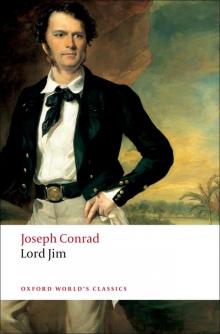 Lord Jim
Lord Jim The Nigger of the Narcissus (Echo Library)
The Nigger of the Narcissus (Echo Library) Victory (Dover Thrift Editions)
Victory (Dover Thrift Editions) Secret Agent
Secret Agent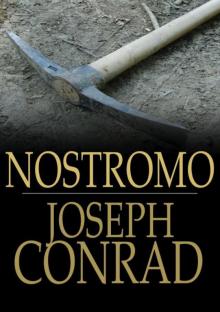 Nostromo
Nostromo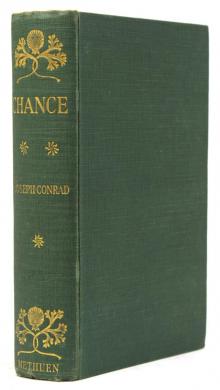 Chance: A Tale in Two Parts
Chance: A Tale in Two Parts Youth
Youth Almayer's Folly
Almayer's Folly The Heart of Darkness and the Secret Sharer
The Heart of Darkness and the Secret Sharer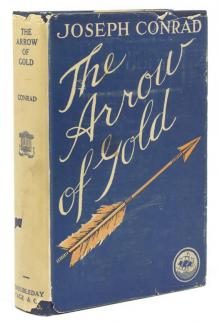 The Arrow of Gold: A Story Between Two Notes
The Arrow of Gold: A Story Between Two Notes The Rescue: A Romance of the Shallows
The Rescue: A Romance of the Shallows The Point Of Honor: A Military Tale
The Point Of Honor: A Military Tale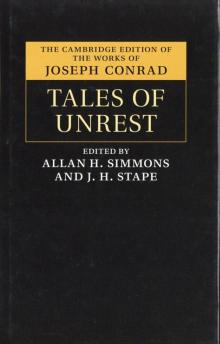 Tales of Unrest
Tales of Unrest Under Western Eyes
Under Western Eyes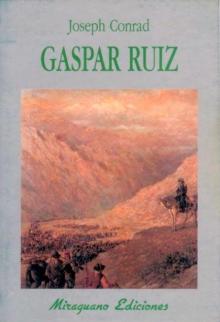 Gaspar Ruiz
Gaspar Ruiz A Set of Six
A Set of Six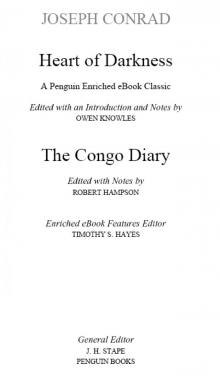 Heart of Darkness and the Congo Diary (Penguin Classics)
Heart of Darkness and the Congo Diary (Penguin Classics) Heart of Darkness and Selected Short Fiction
Heart of Darkness and Selected Short Fiction Typhoon
Typhoon Youth, a Narrative
Youth, a Narrative Tomorrow
Tomorrow The Arrow of Gold
The Arrow of Gold The Shadow Line: A Confession
The Shadow Line: A Confession The Rescue
The Rescue Victory (Echo Library)
Victory (Echo Library) The Brute
The Brute Romance
Romance A Personal Record
A Personal Record Lord Jim: A Tale
Lord Jim: A Tale Heart of Darkness and Selected Short Fiction (Barnes & Noble Classics Series)
Heart of Darkness and Selected Short Fiction (Barnes & Noble Classics Series) Within the Tides
Within the Tides The Secret Sharer and Other Stories
The Secret Sharer and Other Stories Falk
Falk Heart of Darkness and The Secret Sharer
Heart of Darkness and The Secret Sharer Chance
Chance An Anarchist
An Anarchist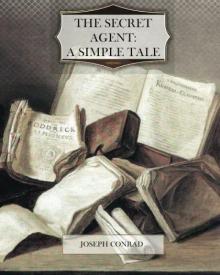 The Secret Agent: A Simple Tale
The Secret Agent: A Simple Tale The Secret Agent
The Secret Agent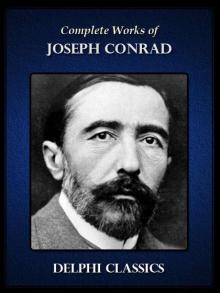 Complete Works of Joseph Conrad (Illustrated)
Complete Works of Joseph Conrad (Illustrated)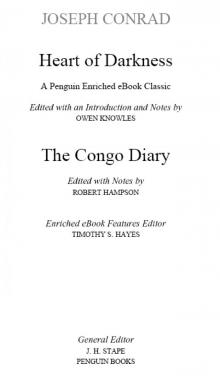 Heart of Darkness and the Congo Diary
Heart of Darkness and the Congo Diary Notes on Life & Letters
Notes on Life & Letters Typhoon (Single Story)
Typhoon (Single Story)